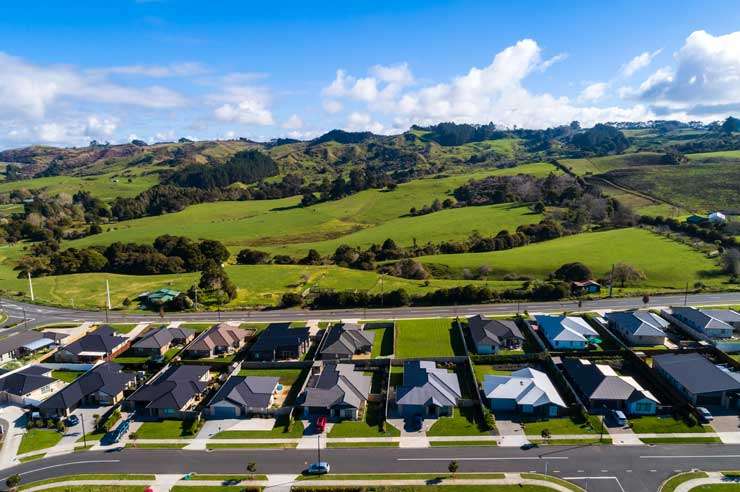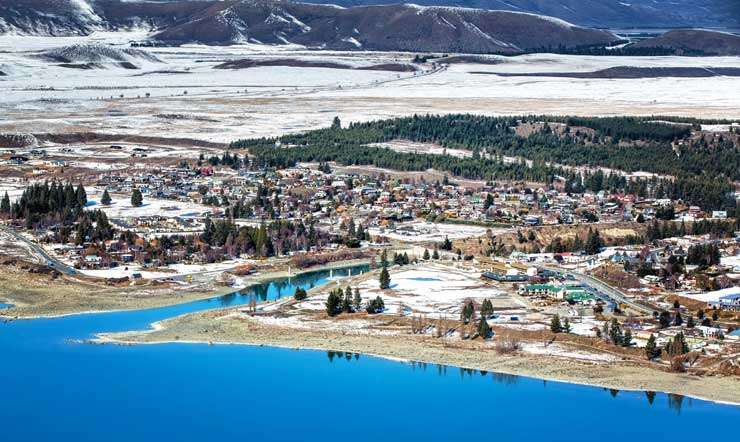The housing market slowdown is starting to bite, with the number of loss-making suburbs quadrupling within the space of a month.
New research from OneRoof and its data partner Valocity shows property values in 105 suburbs across New Zealand have dropped or not grown at all in the last three months, up from 24 in the three months to the end of February.
The research, which excluded suburbs with less than 20 sales over the past year, found the biggest losses were in Auckland. The city saw price drops or zero value growth in 59 suburbs – more than a quarter of the city.
Loss-making suburbs were identified in eight more regions, including Wellington (15); Bay of Plenty (10); West Coast (7); Canterbury (7); Otago (6); Waikato (6); Manawatu-Whanganui (2); and Tasman (1).
Start your property search
The biggest drop outside of Auckland was in Pokeno, in Waikato, where the average property value fell 6.3% ($72,000) in the three months to the end of March to $1.063 million.
Other big fallers identified in the research were Lake Tekapo, in Mackenzie, which suffered a 5.2% loss, and Mamaku, in Rotorua, which was down 5.1%. Kumara, in Westland, and Fielding, in Manawatu, also took big knocks.
James Wilson, head of valuations at Valocity, said the value drop in Pokeno was simply down to the type of property now being sold in the town, just south of Auckland.
Pokeno has been a hive of building activity over the last 10 years, adding more than 2000 homes to the former rural village.
Wilson said that while Pokeno’s average property value had fallen on paper, that didn’t mean the master-planned community of new builds was in crash territory.
Twelve or 18 months ago, most of the sales in the town were of higher-value homes but more recently entry level houses have been selling, dragging down the town’s overall average property value.
Also, timelines for building were being stretched, which means recent home and land package sales haven't flowed through to the data yet. "There's been an increase in time between somebody signing up for a house and land package say and the home being built and settled on,” he said.
"I think that leg effect is having an overall impact on the headline values in Pokeno."
Pokeno Village Estate has been releasing different blocks for some time. Wilson said that anyone who hadn’t been to Pokeno for a while would be stunned by the changes there.
"It used to be just sort of a swamp in the Waikato and now there are houses everywhere. Every time I drive by it really blows my mind."

New-build activity has transformed Pokeno. Photo / Getty Images
Wendy Ploeg, Barfoot & Thompson's Pukekohe sales manager, said that while there had been an easing in the market of late, a bounce-back was on the cards.
Properties were still selling, and she is aware of another three developments underway which will offer lifestyle and residential sections. For now, though, there is a bit of buyer hesitation, with first home buyers being more cautious.
Ploeg said that families stepping up from their first home in South Auckland could get great value for their money – $1.2m or $1.3m buys four bedrooms, three en suites and two living areas. "You're getting a lot of home for your money and it’s brand new."
At the opposite end of the country, Lake Tekapo saw its average property value fall 5.2% ($60,000) to $1.08m in the last three months.
Wilson said that the resort town was dominated by retirees and holiday-homers and had seen few sales over the last 12 months, meaning the average property value jumped around a lot.
It also has a variety of housing types, from lakeside residential with water views to larger lifestyle properties which are almost small farms.
"When you've got such a difference in property type in one location, and when you've got quite big changes in what is selling in terms of volume, a single average value for the area makes it quite hard to represent what is actually going on."
He suspected that the value drop was not a trend but just monthly or quarterly volatility in the figures.

An aerial view of Lake Tekapo, in Mackenzie. The town’s average property value fell 5.2%. Photo / Getty Images
LJ Hooker Steve Howes, who sells in the area, agreed that the value fall reflected the difference in the type of properties trading. “A couple of years ago the houses that were selling were high-end properties of around $1.2m to $1.4m."
Investors locked onto these more modern, newer homes but now homes under the $900,000 mark are trading.
Another problem was that fewer homes were being brought to market. "There are a lot of vendors holding onto their listings, waiting for the spotlight to return on Tekapo, because Tekapo is so driven by visitors and tourists."
Now was a good time to buy because sellers of listed properties tended to be a bit more realistic about a sale price, but all bets were off once the border reopened.
Around $900,000 would still fetch a reasonably modern home but for lake or mountain views you would be paying more like $1.3m, he said.
In rural Feilding, in Manawatu, the average property value fell 3.4% ($25,000) to $719,000. Ray White principal Stu Fleming, whose agents cover the area, said the market had definitely softened. Part of that was down to an increase in listings, but Fleming said that tighter credit rules had “basically got rid of" first home buyers in the last three months.
"That's really slowed the market down. It's not only that, it's all the other stuff that's going on around the real estate market, so you've got the banks tightening up due to Government compliance issues, then you've got inflation, interest rates going up, Covid on top of that and supply problems on top of everything."
Fleming reckoned people needed a rest from the real estate market because of everything that's going on, including the war in the Ukraine.
Feilding had been going gangbusters until recently, he said, with the average sales price higher than nearby Palmerston North. “It's only a few kilometres down the road and it's got everything that Palmy's got."

Valocity head of valuations James Wilson says the reasons for the latest slides are varied. Photo / Fiona Goodall
The current average property value of $719,000 gets you get a decent three or four bedroom home in reasonable nick with a section, he said.
Other areas seeing a dip in average values include Waikanae on the Kapiti Coast. Wilson said there was a lot of growth in the wider Wellington region over the last couple of years after a fairly flat period of many years.
"It really wasn't until probably around the time Covid hit where you really saw Wellington take off."
A lot of first home buyers bought in order not to miss out then those who did miss out found they could no longer afford central Wellington locations so have headed further up the coast, Wilson said.
"But, of course, at the moment that's the group that have already made that purchase and they are far more cautious about the next purchase and that's why you are seeing those areas go really soft because activity has come to a grinding halt."
In Burnside and Merivale in Christchurch value drops of 1.7% each could be because of the new build market there being in a phase where there is not much stock available to purchase until the next wave comes through.
A 1.3% dip in Pyes Pa in Tauranga was probably due to investors becoming more cautious and it's a similar story for Richmond in Tasman, which is down 1.8%, Wilson said
"There's going to be a good deal of let's watch this space and see which suburbs bounce in and bounce out of those small dips or troughs as we move forward.”
















































































